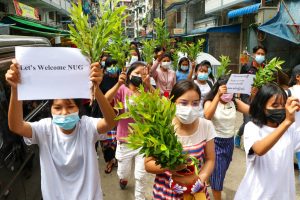On Friday, opponents of Myanmar’s junta formally announced the establishment of a National Unity Government (NUG) aimed at bringing together opponents to military rule, and marshaling local and international support for the restoration of democracy.
Centered on Aung San Suu Kyi and her ousted National League for Democracy (NLD) government, the formation of the NUG marks a culmination of 11 weeks of opposition following the military’s seizure of power on February 1.
“Everyone needs to welcome the newly launched government wholeheartedly. We will connect with the world to work together,” veteran democracy activist Min Ko Naing said in a 10-minute video address announcing the formation of the NUG.
“We are going through a very rough patch because we are trying to uproot the military regime this time,” he added. “This is very exhausting and needs lots of sacrifice.”
The NUG includes Aung San Suu Kyi, who has been in detention since the coup, and centers on the Committee Representing the Pyidaungsu Hluttaw (CRPH), a group made up of mostly NLD parliamentarians elected at the national elections in November. But the unity government also includes anti-coup protest leaders and representatives of ethnic minority organizations.
The goal of the NUG is to establish an alternative government – a sort of internal government-in-exile – that can compete with the junta for international recognition, and spearhead what is likely to be a long campaign to defeat it.
The military’s seizure of power has prompted a massive upsurge of protest that has snarled the junta’s plans for a quick return to normalcy, prompting bloody retribution by the armed forces. At least 737 protesters and bystanders have been killed since the coup, according to the Assistance Association for Political Prisoners, while several thousand have been imprisoned.
The creation of the NUG follows the CRPH’s release at the beginning of the month of a new interim constitution, and a set of principles for the replacement of the military dictatorship with a form of inclusive federal democracy. It thus marks a further hardening of the boundaries of the conflict in Myanmar, and the beginning of a long and possibly violent struggle for the nation’s future.
Its immediate impact within Myanmar remains hard to judge. It remains to be seen how much buy-in the NUG will have from ethnic armed groups that have spent in some cases decades fighting for increased autonomy, and remain crucial to its chances of success. As Carlos Sardiña Galache wrote in a recent essay, creating a new federal army from the CRPH and Myanmar’s ethnic groups (another desired goal of the anti-coup movement) “would require overcoming historic distrust that runs much deeper than the divisions created by the coup.”
Internationally, the formation of the NUG will confront foreign governments with the difficult choice of whether to recognize and throw the full force of their support behind the alternative government. On Friday, Lwin Ko Latt, who has been appointed the NUG’s minister for home affairs and immigration, told reporters that some nations were already intending to formally recognize the NUG as the country’s legitimate government.
“They include some Western countries as well as a member country of the Arab World that experienced the Arab Spring, which we respected and envy very much,” Lwin Ko Latt said, adding that the nations would make their endorsements “in the coming days.”
For many nations this will be a difficult decision to make. There is no doubting the legitimacy of the NLD government that was elected in a landslide last November, and that the NUG represents the will of the majority of the population. Yet formally recognizing the NUG as Myanmar’s government might complicate their ability to keep channels of communication open to the junta.
Such challenges are particularly thorny in the case of the Association of Southeast Asian Nations (ASEAN), which will convene a special summit in Jakarta on April 24 to address the Myanmar crisis. Jarringly for many anti-coup protesters, Myanmar will be represented at the meeting by Sen. Gen. Min Aung Hlaing, who will be making his first known foreign trip since the coup.
On Sunday, the NUG told its neighbors not to recognize the junta and that it had to be part of any negotiations aimed at ending the crisis. “If ASEAN is considering action related to Myanmar affairs, I’d like to say it won’t succeed unless it negotiates with the NUG, which is supported by the people and has complete legitimacy,” Moe Zaw Oo, the NUG’s deputy minister of foreign affairs, said in an interview with Voice of America.

































